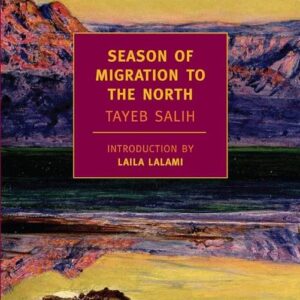Season of Migration to the North by Sudanese author Tayeb Salih (translated by Denys Johnson-Davies) is one of the most famous novels written in Arabic. It follows a nameless narrator who returns from studying literature in Britain to Sudan, where he notices a new face in his village — the mysterious Mustafa Sa’eed. The narrator is disturbed but deeply fascinated by this newcomer, who is of Sudanese origin yet recites English poetry.
Gradually, the narrator unravels the details of his story. As a young boy, Sa’eed’s intellect propelled him from Sudan to Egypt and eventually to London, in a kind of reverse colonial conquest. During his days in London, Sa’eed acted as a weapon in the land of imperialism — symbolically describing himself as a disease that would infect anyone who fell for his “exotic” persona. A callous womanizer, Sa’eed’s relationships with British women often ended violently, leading him to return to Sudan.*
Sa’eed is in many ways the narrator’s alter-ego, both of them highly educated and alienated from both Sudanese and British society. While the narrator tries to contrast himself with Sa’eed’s cold and amoral nature, it becomes clear that the narrator is not the model citizen he appears to be. Instead, the narrator struggles with his passivity and inability to effect change in Sudan. The narrator also becomes closer to Sa’eed’s family, in particular his wife Hosna Bint Mahmoud. Gradually, the line between the narrator and Mustafa Sa’eed begins to blur.
Season of Migration to the North is rich in symbolism and literary devices. It addresses the colonial rhetoric used by Europeans to stereotype Africans as “noble savages” in a wild, disease-ridden world. Salih plays with and inverts these tropes of race and imperialism. He does not romanticize either Sudan or Britain, but rather exposes the brutality of both worlds. The novel is structured by the geographic contrast between the ice of the north and the scorching sun of the south, with the Nile river flowing in between.
Season of Migration to the North is Tayeb Salih’s most famous novel, published in 1966. Salih himself was born in rural Sudan and educated in London. He also spent many years as head of drama for BBC Arabic. His masterpiece is a short but incredibly rich read, making it the perfect choice for students.
Discussion Questions:
- The novel’s opening sentence reads as follows: “It was, gentleman, after a long absence — seven years to be exact, during which time I was studying in Europe — that I returned to my people” (2). Why do you think Salih chose to open Season of Migration to the North in this way? What is the significance of absence and return in the novel?
- How does Salih play with stereotypes of north and south? How do the characters’ journeys from Sudan to Britain and back invert the history of imperialism?
- Issues of gender are quite visible in Season of Migration to the North. How important is masculinity to the narrator and to Mustafa Sa’eed? How do the battles over colonization play out on the bodies of women?
- How do you interpret the ambiguous ending? What do you think of the narrator’s newfound resolution?
*Note: This novel deals with violence and sexual violence.


